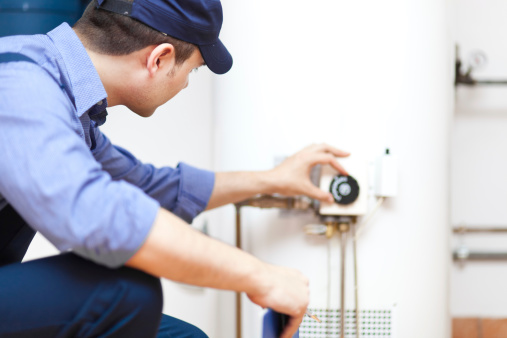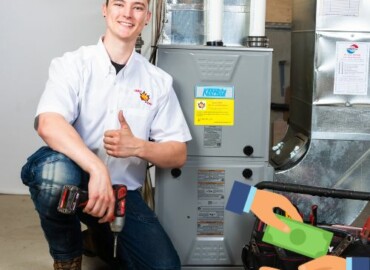How Much does it Cost to Install a New Water Heater?
Choosing the right water heater for your home can be confusing. With so many options available in the market it become more of a tedious task.
In this article, we have discussed the types of water heaters available in the market in detail and how much it to install them.
Types of water heaters with Price
There are several types of water heaters available on the market, each with its own advantages and disadvantages. The prices of water heaters can vary widely depending on the type, size, and features of the unit. Here is an overview of the types of water heaters and their approximate prices.
Here are some of the most common types of water heaters:
1. Conventional Storage Tank Water Heaters
A conventional storage-tank water heater is a type of water heating system that heats and stores water in a tank until it is needed. It is the most common type of water heater found in homes and businesses.
The system typically consists of a large tank, usually made of steel, that is filled with water and heated by a gas or electric burner located at the bottom of the tank. As the water in the tank heats up, it rises to the top of the tank, where it is stored until it is needed.
When hot water is required, the tank releases the water through a pipe at the top of the tank and sends it to the faucet or showerhead. The tank then refills with cold water, and the heating process begins again.
These are the most common type of water heaters, which store and heat water in a tank until it’s needed. They come in various sizes, ranging from 20 to 80 gallons, and can be powered by electricity, natural gas, propane, or oil.
Price range – These can range in price from $300 to $2,000, depending on the size and fuel source. Electric models are typically less expensive than gas or oil models.
2. Tankless Water Heaters
Tankless water heaters, also known as on-demand water heaters, are a type of water heating system that heats water only when it is needed, rather than storing hot water in a tank. These are also known as on-demand water heaters, which heat water directly as it flows through the unit without the use of a storage tank. They are energy-efficient and can save on utility bills over time. They are available in both electric and gas models.
The system typically consists of a unit that is mounted on a wall and connected to the water supply line. When hot water is needed, the unit heats the water as it passes through a series of coils, which are heated by a gas burner or electric element.
One of the primary benefits of a tankless water heater is that it can provide an endless supply of hot water, as long as there is a sufficient supply of cold water. This is because the water is heated on demand, rather than being stored in a tank.
The initial cost of a tankless water heater may be higher than a conventional water heater, but the energy savings over time may offset this cost. Also, the lifespan of a tankless water heater is typically longer than a conventional water heater, with some models lasting up to 20 years.
Price Range – These are more expensive than conventional water heaters, with prices ranging from $500 to $4,000, depending on the size and fuel source. Gas models are typically more expensive than electric models.
3. Heat Pump Water Heaters
Heat pump water heaters use electricity to transfer heat from the air or ground to heat water, making them more energy-efficient than conventional water heaters. They are more expensive than traditional water heaters but can save money in the long run due to their efficiency.
The system typically consists of a heat pump unit, which is connected to a tank for storing hot water. The heat pump unit works by extracting heat from the air or ground outside the home and transferring it to the water in the tank. This process is highly efficient, as it requires only a small amount of electricity to move the heat, rather than generating it directly.
One of the primary benefits of a heat pump water heater is that it can be up to three times more energy efficient than a conventional storage-tank water heater, resulting in lower energy costs. Additionally, the heat pump unit can also provide air conditioning or space heating in some models, providing additional energy savings.
However, it’s important to note that heat pump water heaters may not be suitable for all climates, as they rely on heat from the surrounding air or ground. In cold climates, the system may be less efficient and require additional energy to heat the water. Additionally, the initial cost of a heat pump water heater may be higher than a conventional water heater, but the energy savings over time may offset this cost.
Overall, heat pump water heaters are a highly efficient and eco-friendly option for heating water, especially in areas with moderate temperatures.
Price Range – These are the most expensive type of water heater, with prices ranging from $1,000 to $4,500 or more. However, they are more energy-efficient and can save money on utility bills over time.
4. Solar Water Heaters
Solar water heaters use energy from the sun to heat water, making them an environmentally-friendly option. They can be more expensive upfront but can save money over time due to their energy efficiency. Solar water heaters are a highly sustainable and eco-friendly option for heating water, especially in areas with abundant sunlight. They can significantly reduce energy costs and contribute to a more sustainable future.
The system typically consists of solar collectors, which are mounted on the roof or a nearby structure, and a storage tank for holding the hot water. The solar collectors work by absorbing energy from the sun and transferring it to a heat-transfer fluid, such as water or antifreeze, which circulates through the system and heats the water in the tank.
One of the primary benefits of a solar water heater is that it can significantly reduce energy costs, as it uses free and renewable energy from the sun. Additionally, solar water heaters have a long lifespan, with some systems lasting up to 30 years or more.
However, it’s important to note that solar water heaters may not be suitable for all climates, as they rely on sunlight to heat the water. In areas with limited sunlight, a backup heating source may be necessary, which can increase installation and maintenance costs.
Price Range – These can range in price from $1,500 to $4,000 or more, depending on the size and features of the unit. While they are more expensive up front, they can save money over time due to their energy efficiency.
5. Tankless Coil and Indirect Water Heaters
Tankless coil and indirect water heaters are two types of water heating systems that are often used in conjunction with a home’s heating system. Tankless coil water heaters are integrated into a home’s boiler, while indirect water heaters are separate units that are connected to a boiler.
A tankless coil water heater works by using the home’s heating system to heat the water as it passes through a heat exchanger. The heat exchanger is usually located inside the heating system’s boiler, and as the water flows through it, it is heated by the hot water or steam generated by the boiler. The heated water then flows directly to the faucet or showerhead.
An indirect water heater, on the other hand, works by using a separate heat source, such as a boiler or furnace, to heat water in a separate storage tank. The heat source heats the water in the tank indirectly, through a heat exchanger located inside the tank. The heated water is then available for use throughout the home.
One of the primary benefits of these systems is that they are highly efficient, as they use the home’s existing heating system to heat the water, rather than relying on a separate energy source. Additionally, because they do not have a separate burner, they are often quieter and require less maintenance than other types of water heaters.
However, it’s important to note that these systems may not be suitable for all homes, as they require a heating system with a boiler or furnace. Additionally, they may not be as efficient as other types of water heaters, such as tankless or solar water heaters.
Overall, tankless coil and indirect water heaters are a cost-effective and efficient option for heating water in homes with existing heating systems.
Price Range – These can range in price from $500 to $2,500 or more, depending on the size and features of the unit. They are typically less expensive than tankless or heat-pump water heaters.
Cost to install and replace a Water Heater?
On average, a basic electric or gas water heater installation can cost anywhere from $500 to $1,500, while a more advanced tankless water heater can cost $1,000 to $3,000 or more. The cost to install a water heater can vary depending on a number of factors, including the type of water heater, the size of the unit, and the complexity of the installation.
In addition to the cost of the unit itself, there may be additional costs for installation, permits, and labor. The cost of installation can vary based on the complexity of the project, the location of the water heater, and whether any modifications to the plumbing or electrical systems are needed.
It’s important to note that the cost of installation may also include additional services such as removing and disposing of the old water heater, as well as any repairs or upgrades that may be needed to the existing plumbing or electrical systems.
To get an accurate estimate of the cost to install a water heater, it’s recommended to consult with a professional plumber or HVAC technician who can assess your specific needs and provide a detailed estimate based on your individual circumstances.
Factors Affecting Water Heater Installation Costs
The installation costs for a water heater depend on several factors, and it’s important to consider these factors when choosing a water heater and budgeting for the installation.
Several factors can affect the installation costs of a water heater, including –
- Type of water heater – The type of water heater you choose will affect the installation cost. For example, a tankless water heater may require a larger gas line or electrical circuit than a conventional water heater, which can increase installation costs.
- Fuel source – The fuel source for your water heater can also impact installation costs. For example, if you are switching from an electric to a gas water heater, you may need to install a new gas line, which can increase installation costs.
- Location – The location of the water heater can also impact installation costs. If the water heater is located in a hard-to-reach area, such as a crawl space or attic, it may require additional labor and materials to install.
- Permit and code requirements – Depending on your location, you may need to obtain permits and comply with building codes to install a water heater. These requirements can add to the installation costs.
- Labor costs – The labor costs for installing a water heater will vary depending on the complexity of the installation, the size of the water heater, and the experience of the installer.
- Extra features – If you want to add additional features to your water heater, such as a recirculation pump or a hot water recirculation system, this can also increase installation costs.
Ways to maintain your water heater
Maintaining your water heater can help prolong its lifespan and ensure that it operates efficiently. Here are some ways to maintain your water heater. By following these maintenance tips, you can help prolong the lifespan of your water heater and ensure that it operates efficiently.
- Check the temperature – The temperature of the water heater should be set between 120- and 140 degrees Fahrenheit. If the temperature is too high, it can waste energy and increase the risk of scalding.
- Inspect the pressure relief valve – The pressure relief valve is an important safety feature of the water heater, and it should be inspected annually. The valve should be working properly and not leaking.
- Flush the tank – Over time, sediment can accumulate in the tank, which can reduce the efficiency of the water heater. Flushing the tank once a year can help remove sediment and improve efficiency.
- Check the anode rod – The anode rod is designed to prevent rust and corrosion in the tank. Checking and replacing the anode rod every 3-5 years can help prolong the lifespan of the water heater.
- Insulate the pipes – Insulating the hot water pipes can help reduce heat loss and improve energy efficiency.
- Schedule regular maintenance – Regular maintenance from a professional plumber can help ensure that the water heater is operating efficiently and identify any potential problems before they become major issues.




